Jazz is a music genre that originated in the African-American communities of New Orleans, Louisiana, in the late 19th and early 20th centuries, with its roots in blues, ragtime, European harmony and African rhythmic rituals. Since the 1920s Jazz Age, it has been recognized as a major form of musical expression in traditional and popular music. Jazz is characterized by swing and blue notes, complex chords, call and response vocals, polyrhythms and improvisation.

Herbert Jeffrey Hancock is an American jazz musician, bandleader, and composer. Hancock started his career with trumpeter Donald Byrd's group. He shortly thereafter joined the Miles Davis Quintet, where he helped to redefine the role of a jazz rhythm section and was one of the primary architects of the post-bop sound. In the 1970s, Hancock experimented with jazz fusion, funk, and electro styles, using a wide array of synthesizers and electronics. It was during this period that he released perhaps his best-known and most influential album, Head Hunters.
Modal jazz is jazz that makes use of musical modes, often modulating among them to accompany the chords instead of relying on one tonal center used across the piece.
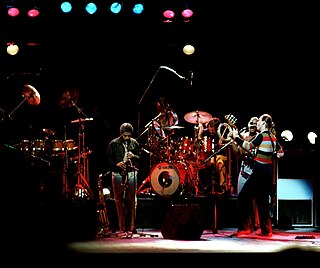
Weather Report was an American jazz fusion band active from 1970 to 1986. The band was founded in 1970 by Austrian keyboardist Joe Zawinul, American saxophonist Wayne Shorter, Czech bassist Miroslav Vitouš, American drummer Alphonse Mouzon as well as American percussionists Don Alias and Barbara Burton. The band was initially co-led by co-frontmen Zawinul and Shorter but, subsequently as the 1970s progressed, Zawinul largely became the sole musical leader of the group. Other prominent members at various points in the band's lifespan included Jaco Pastorius, Alphonso Johnson, Victor Bailey, Chester Thompson, Peter Erskine, Airto Moreira, and Alex Acuña. Throughout most of its existence, the band was a quintet consisting of Zawinul, Shorter, a bass guitarist, a drummer, and a percussionist.

Wynton Learson Marsalis is an American trumpeter, composer, and music instructor, who is currently the artistic director of Jazz at Lincoln Center. He has been active in promoting classical and jazz music, often to young audiences. Marsalis has won nine Grammy Awards, and his oratorio Blood on the Fields was the first jazz composition to win the Pulitzer Prize for Music. Marsalis is the only musician to have won a Grammy Award in both jazz and classical categories in the same year.
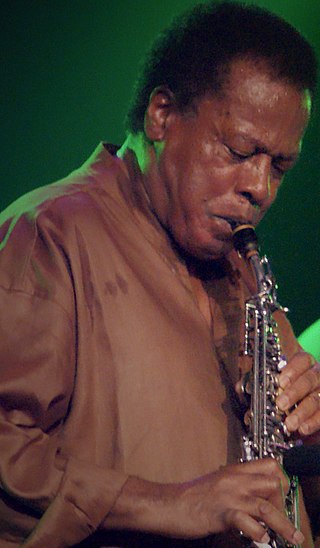
Wayne Shorter was an American jazz saxophonist, composer and bandleader. Shorter came to mainstream prominence in 1959 upon joining Art Blakey's Jazz Messengers, for whom he eventually became the primary composer. In 1964 he joined Miles Davis' Second Great Quintet, and then co-founded the jazz fusion band Weather Report in 1970. He recorded more than 20 albums as a bandleader.
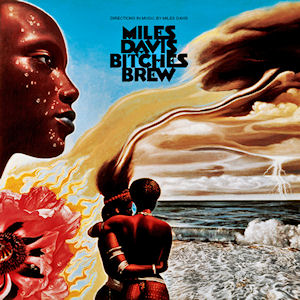
Bitches Brew is a studio album by the American jazz trumpeter, composer, and bandleader Miles Davis. It was recorded from August 19 to 21, 1969, at Columbia's Studio B in New York City and released on March 30, 1970, by Columbia Records. It marked his continuing experimentation with electric instruments that he had featured on his previous record, the critically acclaimed In a Silent Way (1969). With these instruments, such as the electric piano and guitar, Davis departed from traditional jazz rhythms in favor of loose, rock-influenced arrangements based on improvisation. The final tracks were edited and pieced together by producer Teo Macero.

Woody Herman Shaw Jr. was an American jazz trumpeter, flugelhornist, cornetist, composer, arranger, band leader, and educator. Shaw is widely known as one of the 20th century's most important and influential jazz trumpeters and composers. He is often credited with revolutionizing the technical and harmonic language of modern jazz trumpet playing, and is regarded by many as one of the major innovators of the instrument. He was an acclaimed virtuoso, mentor, and spokesperson for jazz and worked and recorded alongside many of the leading musicians of his time.
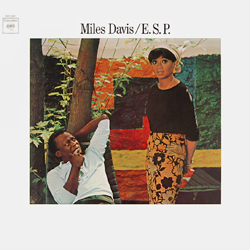
E.S.P. is an album by Miles Davis, recorded on January 20–22, 1965 and released on August 16 of that year by Columbia Records. It is the first release from what is known as Davis's second great quintet: Davis on trumpet, Wayne Shorter on tenor saxophone, Herbie Hancock on piano, Ron Carter on bass, and Tony Williams on drums. The album was named after a tune by Shorter, and was inspired by the fact that, "since Wayne Shorter's arrival, the five members of the quintet seemed to communicate by mental telepathy."

Miles Smiles is an album by the jazz musician Miles Davis. It was released on February 16, 1967 through Columbia Records. It was recorded by Davis and his second quintet at Columbia 30th Street Studio in New York City on October 24 and October 25, 1966. It is the second of six albums recorded by Davis' second great quintet, which featured tenor saxophonist Wayne Shorter, pianist Herbie Hancock, bassist Ron Carter, and drummer Tony Williams.

Nefertiti is a studio album by the jazz trumpeter and composer Miles Davis. It was released in March 1968 through Columbia Records. The recording was made at Columbia's 30th Street Studio over four dates between June 7 and July 19, 1967, the album was Davis' last fully acoustic album. Davis himself did not contribute any compositions – three were written by tenor saxophonist Wayne Shorter, two by pianist Herbie Hancock, and one by drummer Tony Williams.

The Complete Live at the Plugged Nickel 1965 is a live box set of the Miles Davis Quintet, recorded on December 22 and 23, 1965. First released in Japan in March 1992 by Sony Records as a 7 disc set, it was re-released on Legacy Records in July 1995 as an 8 disc set. In conjunction with Legacy, Mosaic Records released a 10 LP set. It was re-released as an SA-CD Box in October 2023 in a limited edition of 1500 by Sony Japan for Tower Records Japan. It comprises recordings of seven performance sets over the two nights by the second great Davis quintet at the now-defunct Plugged Nickel nightclub in Chicago. A single-disc sampler, Highlights from the Plugged Nickel was released by Legacy on November 14, 1995, and was reissued on February 1, 2008.

Quartet is the twenty-seventh album by jazz pianist Herbie Hancock, featuring a quartet with trumpeter Wynton Marsalis, bassist Ron Carter and drummer Tony Williams. It was originally issued in Japan on CBS/Sony, and later given a US release by Columbia.

Live at the Fillmore East March 7, 1970: It's About That Time is a live double album by Miles Davis recording two sets performed on March 7, 1970 and released by Columbia/Legacy in 2001, although the concert had previously circulated as a bootleg recording.
"Footprints" is a jazz standard composed by saxophonist Wayne Shorter and first recorded for his album Adam's Apple in 1966. The first commercial release of the song was a different recording on the Miles Davis album Miles Smiles recorded later in 1966, but released earlier. It has become a jazz standard.
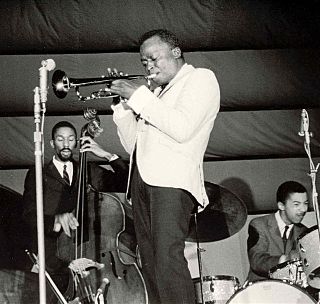
The Miles Davis Quintet was an American jazz band from 1955 to early 1969 led by Miles Davis. The quintet underwent frequent personnel changes toward its metamorphosis into a different ensemble in 1969. Most references pertain to two distinct and relatively stable bands: the First Great Quintet from 1955 to 1958, and the Second Great Quintet from late 1964 to early 1969, Davis being the only constant throughout.

Introducing Wayne Shorter is the debut album by jazz saxophonist Wayne Shorter. It was recorded on November 9 and 10, 1959, at Bell Sound Studios in New York City. It features five Shorter compositions, plus Kurt Weill's "Mack the Knife”, performed by a quintet featuring trumpeter Lee Morgan, pianist Wynton Kelly, bassist Paul Chambers and drummer Jimmy Cobb. Shorter played with Morgan in the front line of Art Blakey's Jazz Messengers at this time while Kelly, Chambers and Cobb were the widely celebrated rhythm section with Miles Davis.

Water Babies is a compilation album by American jazz trumpeter Miles Davis. It compiled music Davis recorded in studio sessions with his quintet in 1967 and 1968, including outtakes from his 1968 album Nefertiti and recordings that foreshadowed his direction on In a Silent Way (1969), while covering styles such as jazz fusion and post-bop. Water Babies was released by Columbia Records in 1976 after Davis had (temporarily) retired.
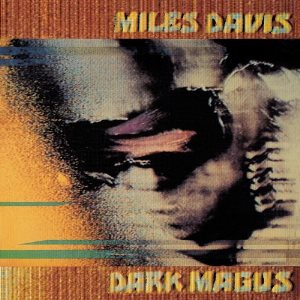
Dark Magus is a live double album by the American jazz trumpeter, composer, and bandleader Miles Davis. It was recorded on March 30, 1974, at Carnegie Hall in New York City, during the electric period in Davis' career. His group at the time included bassist Michael Henderson, drummer Al Foster, percussionist Mtume, saxophonist Dave Liebman, and guitarists Pete Cosey and Reggie Lucas; Davis used the performance to audition saxophonist Azar Lawrence and guitarist Dominique Gaumont. Dark Magus was produced by Teo Macero and featured four two-part recordings, titled with the Swahili numerals for numbers one through four.

Miles in Tokyo is a live album recorded on July 14, 1964, by the Miles Davis Quintet at the Tokyo Kōsei Nenkin Kaikan, Shinjuku, Tokyo, Japan. It was released in the United States on CD in 2005 and is the first recording of Davis in Japan. It is the only album to showcase an early incarnation of his Second Great Quintet featuring Sam Rivers on tenor saxophone, following George Coleman's departure; after this, Wayne Shorter's appointment completed the classic lineup that recorded such albums as ESP and Miles Smiles, through to Miles in the Sky.


















